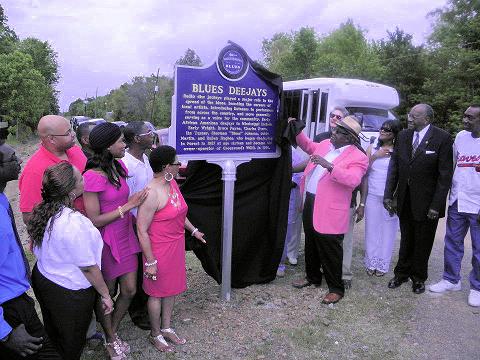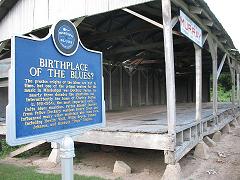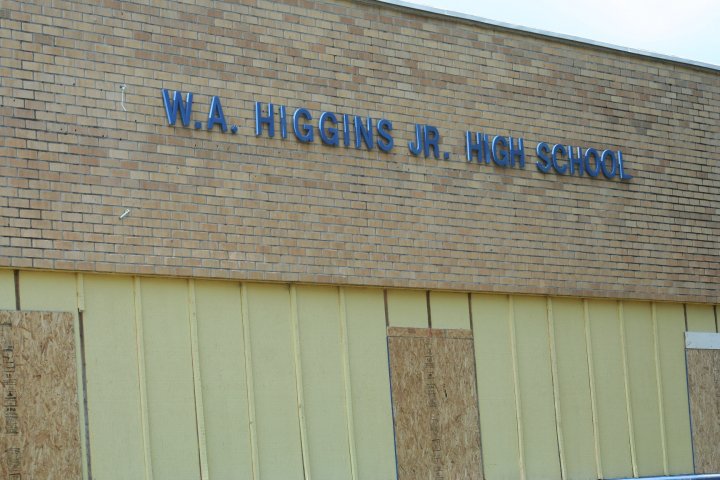
From The Mississippi Link Newswire
GREENWOOD – A ceremony was held in Greenwood Friday, with a vast mixed crowd, to honor the many contributions made by Mississippi’s black disc jockeys. The ceremony’s highlight, was the unveiling of a marker on the Mississippi Blues Trail.
Radio disc jockeys played a major role in the spread of the blues, boosting the careers of local artists, introducing listeners to performers from across the country, and more generally serving as a voice for the community.
Early pioneering black DJ’s included: William “Dr. Daddy O” Harvey on Jackson’s WJDX, Early Wright on Clarksdale’s WROX, Charles Evers on Philadelphia’s WHOC, Jerome Stampley on Vicksburg’s WQBC and Bruce “Jet Pilot of Jive” Payne on Vicksburg’s WVIM.
In 1954, Jackson’s WOKJ became the first station in the state to adopt an all-black format. Its deejays included Payne, Wade “Poppa Rock” Graves and Jobie Martin (“The Loud Mouth of the South”).
Martin was killed in a car accident on March 26, 2011 in Jackson. Martin was 91.
Other popular deejays were Sherman “Blues” Johnson and Lee Arthur “House Rocker” Rhodes in Meridian, Ike Turner in Clarksdale, Rockin’ Ed Williams in Leland and Ruben Hughes, who began deejaying in his native Forest, Miss., in 1957 at the age of 16. He became the owner-operator of Greenwood’s WGNL in 1988.
The blues marker was unveiled Friday near the WGNL station at 503 Lone Street in Greenwood.
Native Mississippians who found success as disc jockeys elsewhere included WDIA’s B.B. King and Rufus Thomas; Chicagoans Al Benson, Pervis Spann, Lucky Cordell and Bill Tyson; James “Oakey Doakey” Smith in New Orleans; and Big Ike Darby in Mobile.
Deejays were often also active in concert promotion, artist management or the record business in general.
The disc jockey (or “deejay”) format did not become the primary mode of programming music on radio stations until the 1940s.
In earlier years, musicians usually performed live in the broadcast studios, and the musicians’ union did not want its members to be replaced by recordings. Exorbitant fees charged by ASCAP, the major collection agency for publishers of mainstream popular music, led many stations to program music not controlled by ASCAP, especially blues, R&B, and country music, after World War II, when numerous new radio stations were licensed in Mississippi and across the country.
The new stations sought to differentiate themselves, and one way was through featuring disc jockeys with colorful personalities and monikers who selected their playlists and read ads and announcements.
The deejay format is often credited to Jack L. Cooper, who began playing records on the air in the early 1930s on Chicago’s WSBC, after debuting his “All-Negro Hour” with live music there in 1929.
In 1949, Memphis’ WDIA became the first station to feature all-African American programming, while many other stations began airing African American specialty shows.
A Mississippian who worked as a deejay and promoter both in and out of the state was Ruben Hughes. Hughes began at WMAG and later worked at WQIC in Meridian and at stations in Mobile, Houston, Chicago and Memphis.
In 1969, Hughes, together with Vernon and Robert Floyd, started the first African American-owned station in the state, Hattiesburg’s WORV. In 1988, Hughes purchased WGNL in Greenwood and built it into one of the most powerful stations in the Delta, featuring “Oldies, R&B & Blues,” gospel and community programming.




Be the first to comment